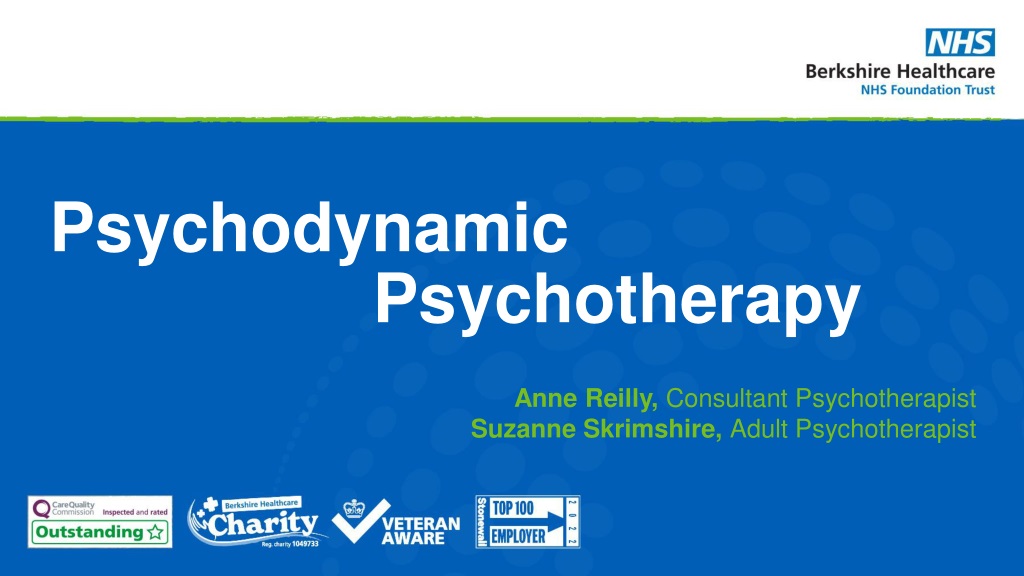

0 likes | 9 Views
Psychodynamic psychotherapy is a talking therapy that helps individuals struggling with mental health issues by exploring unconscious problems rooted in the past. Psychotherapists conduct therapy sessions, facilitate group work, assess mental health needs, provide supervision, and work in various settings such as the NHS, trauma units, private practice, schools, and more. Becoming a psychotherapist requires a postgraduate qualification, experience in mental health, and a minimum of four years of part-time training. Qualities needed include curiosity, patience, teamwork, and open-mindedness.

E N D
Psychodynamic Psychotherapy Anne Reilly, Consultant Psychotherapist Suzanne Skrimshire, Adult Psychotherapist
What is Psychodynamic Psychotherapy? Psychodynamic Psychotherapy is one of the 'talking therapies' designed to help people who are struggling with their mental health. It draws on theories and practices of analytical psychology and psychoanalysis. This is based on the idea that what we experience as a conscious difficulty in the present may point to an unconscious problem which has its roots in the past. Psychotherapy works with emotions as well as cognitions and is best described as an exploratory approach. It is also known as a relational way of working.
What do Psychotherapists do? See people individually or in a group for therapy sessions, usually weekly Facilitate psychological group work in multidisciplinary teams Conduct assessments of mental health needs Provide psychodynamic supervision to peers and other teams Chair Complex Case Forums where difficult cases are presented Are present in referrals meetings where treatment decisions are made Work as part of Integrated Psychological Teams (IPTs) • • • • • • •
Where do Psychotherapists work? • In the NHS – as part of psychological therapies teams • Trauma units • Refugee services • Private practice • Businesses and organisations • Schools • In education – training institutions
How do I become a Psychotherapist Postgraduate qualification; i.e. You cannot do an undergraduate degree in Psychotherapy • Must have completed a degree at undergraduate level – can be in any subject • Have experience of working within mental health either in a voluntary or professional capacity • Psychotherapy training is minimum of four years part time and gives you a professional qualification • Choose a fully validated training – UKCP (certain colleges – CJPA), BPC : bpc.org.uk/about-psychotherapy/what-psychotherapy • Interview: designed to look into your capacity and willingness to engage with work of this nature • Personal therapy – prior to and during the training on a continuous basis • You need some NHS experience/placement especially if you wish to work in the NHS
An individual’s journey BA hons in Modern Foreign Languages • Worked as a secondary school teacher and tutor for local authority • Did foundation training year in psychodynamic psychotherapy • Commenced voluntary work in local mental health drop-in centre to support training • Commenced paid work as Support Worker alongside tutoring • Undertook psychotherapy training for four years, while working and raising a family. • On qualification, set up a part time private practise and began work in the NHS •
What qualities do I need? Curiosity about your own inner world and that of others The ability to tolerate painful feelings in yourself and others Patience Teamwork Report-writing Open-mindedness
Further information • British Psychoanalytic Council (BPC) – bpc.org.uk/training • UK Council for Psychotherapy (UKCP) – psychotherapy.org.uk/psychotherapy-training/ • Please see the leaflets we have available on Psychodynamic Psychotherapy and the FAQ Leaflet • Email CareersEvents@berkshire.nhs.uk if you don’t have a copy of these